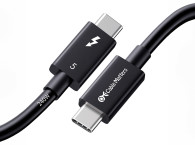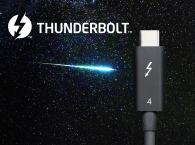
"Intel has always been the industry pioneer and leader for wired connectivity solutions, and Thunderbolt is now the mainstream port on mobile PCs and integrated into three generations of Intel mobile CPUs. We’re very excited to lead the industry forward with the next generation of Thunderbolt built on the USB4 v2 specification, advanced to this next generation by Intel and other USB Promoter Group members," says Jason Ziller, general manager of the Client Connectivity Division at Intel
The prototype demonstration by Intel marks a major milestone in the journey to deliver next-generation Thunderbolt to the industry. The bandwidth needs of content creators and gamers are increasing significantly for high-resolution displays, low latency visuals, and the backup or transfer of huge video and data files. Next-generation Thunderbolt will deliver up to three times the capability of Thunderbolt 4 and make creating and gaming more efficient and immersive.

In addition to supporting the latest version of USB4, the next generation of Thunderbolt will include improvements across a variety of areas including two times the total bandwidth of Thunderbolt 4 to 80 Gbps, while providing up to three times the bandwidth to 120 Gbps for video-intensive usages.
The update Thunderbolt will also support the newly released DisplayPort 2.1 for the best display experience with up to two times the PCI Express data throughput for faster storage and external graphics. The technology works with existing passive cables up to 1m via a new signaling technology and is compatible with previous versions of Thunderbolt, USB and DisplayPort.

As with other Thunderbolt products, Intel supports development and certification programs. With the vision to make Thunderbolt available to everyone, Intel in 2019 contributed to the USB Promoter Group its Thunderbolt protocol specification, which served as the basis for USB4. As a leader in this industry group, Intel has worked to extend the performance of USB4 to the next level. Intel works closely with PC, accessory and cable partners to deliver the most advanced and complete wired connectivity solution through dedicated enabling and testing programs. All Thunderbolt products undergo stringent certification testing, and upon passing can use the Thunderbolt name and logo royalty-free on devices or in marketing. That’s why the Thunderbolt logo provides a simple, easily recognized indicator of the best wired connectivity solutions for PCs and accessories.
More details on this next-generation Thunderbolt will be announced in 2023, including the official brand name, features and capabilities.
www.intel.com







